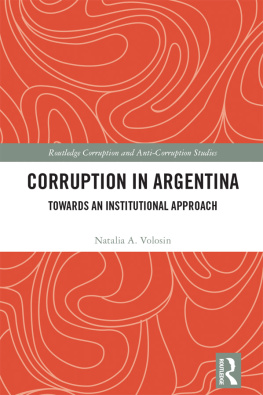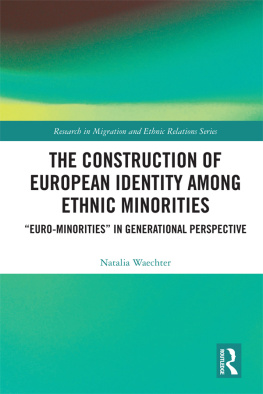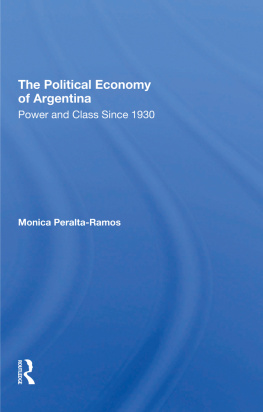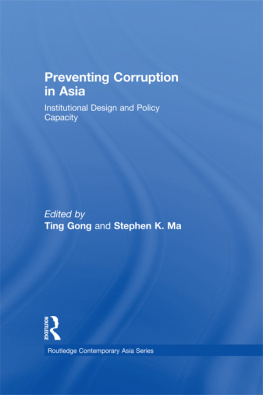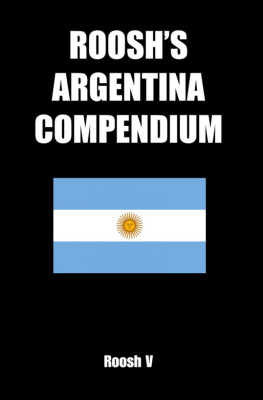Corruption in Argentina
The book provides an institutional, historical, and sectorial analysis of Argentinas structural corruption. Looking back over the last 200 years, the book demonstrates that Argentina has historically addressed corruption through ineffective debates between publicprivate biases or a cultural-criminal approach reinforced by modernization theory, neither of which have helped tackle the problem. Instead, Volosin proposes meaningful institutional reforms to reduce opportunities for corruption and to increase monitoring incentives and capabilities.
The book argues that political economy hindrances for reform are as significant as reform itself and shows that in times of crisis or scandal, the need to move quickly to satisfy citizen demands forces politicians to promote unplanned changes that lack real teeth. Moreover, the machines reach over most public and private actors precludes regime-undermining reform, which is precisely what is needed to meaningfully attack entrenched structural corruption. In order to combat serious deficits in the public procurement regime, Volosin recommends a micro-sectorial analysis of government procurement, supported by an innovative human rights strategy, to help measure and disclose corruptions hidden social cost, raise awareness, integrate vulnerability criteria into the fight against corruption, and employ local, regional, and international litigation and monitoring tools to compel the political branches to perform structural change.
This innovative exploration into corruption in Argentina will be of interest to researchers working on public policy, administrative law, anticorruption studies, law and development, and governance both in Argentina, and beyond.
Natalia A. Volosin completed her J.S.D. at Yale Law School, USA, and is now Senior Law Clerk in the National Attorney Generals Office, Argentina.
Routledge Corruption and Anti-Corruption Studies
The series features innovative and original research on the subject of corruption from scholars around the world. As well as documenting and analysing corruption, the series aims to discuss anti-corruption initiatives and endeavours, in an attempt to demonstrate ways forward for countries and institutions where the problem is widespread. The series particularly promotes comparative and interdisciplinary research targeted at a global readership.
In terms of theory and method, rather than basing itself on any one orthodoxy, the series draws broadly on the tool kit of the social sciences in general, emphasizing comparison, the analysis of the structure and processes, and the application of qualitative and quantitative methods.
Anti-Corruption in International Development
Ingrida Kerusauskaite
Corruption Scandals and their Global Impacts
Edited by Omar E. Hawthorne and Stephen Magu
Public Probity and Corruption in Chile
Patricio Silva
Corruption in Argentina
Towards an Institutional Approach
Natalia A. Volosin
Corruption in a Global Context
Restoring Public Trust, Integrity, and Accountability
Edited by Melchior Powell, Dina Wafa, and Tim A. Mau
Corruption and Informal Practices in the Middle East and North Africa
Edited by Ina Kubbe and Aiysha Varraich
For more information about this series, please visit: https://www.routledge.com/Routledge-Corruption-and-Anti-Corruption-Studies/book-series/RCACS
Corruption in Argentina
Towards an Institutional Approach
Natalia A. Volosin
Foreword by Susan Rose-Ackerman
First published 2020
by Routledge
2 Park Square, Milton Park, Abingdon, Oxon OX14 4RN
and by Routledge
52 Vanderbilt Avenue, New York, NY 10017
Routledge is an imprint of the Taylor & Francis Group, an informa business
2020 Natalia A. Volosin
The right of Natalia A. Volosin to be identified as author of this work has been asserted by her in accordance with sections 77 and 78 of the Copyright, Designs and Patents Act 1988.
All rights reserved. No part of this book may be reprinted or reproduced or utilised in any form or by any electronic, mechanical, or other means, now known or hereafter invented, including photocopying and recording, or in any information storage or retrieval system, without permission in writing from the publishers.
Trademark notice: Product or corporate names may be trademarks or registered trademarks, and are used only for identification and explanation without intent to infringe.
British Library Cataloguing-in-Publication Data
A catalogue record for this book is available from the British Library
Library of Congress Cataloging-in-Publication Data
A catalog record for this book has been requested
ISBN: 978-0-367-33871-8 (hbk)
ISBN: 978-0-429-32253-2 (ebk)
Typeset in Goudy
by Apex CoVantage LLC
To my children, Julin and Tomas.
Contents
The author of this book, Natalia A. Volosin, is a prominent anticorruption campaigner and human rights advocate in Argentina. In her home country, she struggles against the defeatist attitude that corruption is so embedded in the culture that it is fruitless to strive for public integrity. Argentines sometimes claim that they cannot succeed in reducing corruption because, after all, they are all descended from smugglers. Volosin rejects such facile claims, and in this important book, she convincingly argues that legal and institutional change can lead to social change and a less corrupt future. Reform will not be easy, but, she argues, an alliance between anticorruption advocates and the human rights community can strengthen both. Volosin critiques work that overemphasizes cultural factors and the criminal law. She highlights the crucial role of institutional weaknesses and their connection to the countrys development.
Volosin argues that anticorruption forces (e.g., civil society, legal clinics, the Ombudsman) should ally with human rights advocates to pursue broad institutional reform. The human rights connection can reveal corruptions hidden social costs, raise awareness, and integrate the protection of vulnerable populations into the fight against corruption, pushing the political branches to make structural changes. She connects that argument with Argentinas long-standing human rights tradition and its experience with experimental and public interest litigation. However, she is realistic about the prospects; there are no high-flown claims of a corruption-free future. But she is also realistic about practical routes to reform. Her analysis should be of interest outside of Argentina in middle-income democracies worldwide, but perhaps especially in Latin America.
Volosin draws lessons from Argentinas history. She provides an in-depth analytic history of public corruption in Argentina over the past 200 years that can provide the basis for a constructive way forward. Building on that historical background, she draws heavily on the work of Carlos Nino, the distinguished Argentine legal and constitutional theorist, and on my own institutional and political-economic approach to corruption. Her merger of constitutional theory and political economy is novel and generative for the study of corrupt polities.
In Argentina, political instability, authoritarianism, lack of checks and balances, patrimonialism, corporatism, and concentrations of political and economic power have influenced both developmental and corruption-building processes, and these have, in turn, increased those institutional deficits in a vicious spiral. These factors will sound familiar to those seeking to limit corruption in other parts of the world were turning a vicious spiral into a virtuous spiral is an ongoing challenge.


